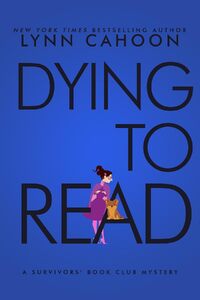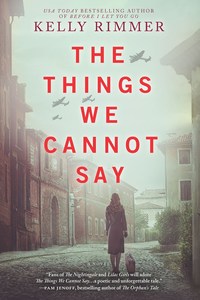 AN AMISH WIDOW'S PROMISE |
|

Graydon House Read Kindle PreviewIn 1942, Europe remains in the relentless grip of war. Just beyond the tents of the Russian refugee camp she calls home, a young woman speaks her wedding vows. It’s a decision that will alter her destiny…and it’s a lie that will remain buried until the next century. Since she was nine years old, Alina Dziak knew she would marry her best friend, Tomasz. Now fifteen and engaged, Alina is unconcerned by reports of Nazi soldiers at the Polish border, believing her neighbors that they pose no real threat, and dreams instead of the day Tomasz returns from college in Warsaw so they can be married. But little by little, injustice by brutal injustice, the Nazi occupation takes hold, and Alina’s tiny rural village, its families, are divided by fear and hate. Then, as the fabric of their lives is slowly picked apart, Tomasz disappears. Where Alina used to measure time between visits from her beloved, now she measures the spaces between hope and despair, waiting for word from Tomasz and avoiding the attentions of the soldiers who patrol her parents’ farm. But for now, even deafening silence is preferable to grief. Slipping between Nazi-occupied Poland and the frenetic pace of modern life, Kelly Rimmer creates an emotional and finely wrought narrative that weaves together two women’s stories into a tapestry of perseverance, loyalty, love and honor. The Things We Cannot Say is an unshakable reminder of the devastation when truth is silenced…and how it can take a lifetime to find our voice before we learn to trust it. Excerpt Soviet Union—1942 The priest presiding over my wedding was half-starved, half-frozen and wearing rags but he was resourceful; he’d blessed a chunk of moldy bread from breakfast to serve as a communion wafer. “Repeat the vows after me,” he smiled. My vision blurred, but I spoke the traditional vows through lips numb from cold. “I take you, Tomasz Slaski, to be my husband, and I prom¬ise to love, honor, and respect, to be faithful to you, and not to forsake you until we are parted by death, in fear of God, One in the Holy Trinity and all the Saints.” I’d looked to my wedding to Tomasz as a beacon, the same way a sailor on rough seas might fix his gaze upon a lighthouse at the distant shore. Our love had been my reason to live and to carry on and to fight for so many years, but our wedding day was supposed to be a brief reprieve from all of the hardship and suffering. The reality of that day was so very different, and my disappointment in those moments seemed bigger than the world itself. We were supposed to marry in the regal church in our home town not there, standing just beyond the tent city of the Buzuluk refugee and military camp, just far enough from the tents that the squalid stench of eighty thousand desperate souls was slightly less thick in the air. That reprieve from the crowds and the smell came at cost; we were outside, sheltered only by the branches of a sparse fir tree. It was an unseasonably cold day for fall, and every now and again, fat snowflakes would fall from the heavy gray skies to melt into our hair or our clothing or to make still more mud in the ground around our feet. I’d known my “friends” in the assembled crowd of well- wishers for only a few weeks. Every other person who’d once been important to me was in a concentration camp or dead or just plain lost. My groom awkwardly declined to take communion—a gesture which bewildered that poor, kindly priest, but didn’t surprise me one bit. Even as the bride, I wore the only set of clothes I owned, and by then once- simple routines like bathing had become luxuries long forgotten. The lice infestation that had overrun the entire camp had not spared me, nor my groom, nor the priest —nor even a single individual in the small crowd of well- wishers. Our entire assembly shifted and twitched constantly, desperate to soothe that endless itch. I was dull with shock, which was almost a blessing, because it was probably all that saved me from weeping my way through the ceremony. Mrs. Konczal was yet another new friend to me, but she was fast becoming a dear one. She was in charge of the orphans, and I’d been working alongside her on compulsory work duties since my arrival at the camp. When the ceremony was done, she ushered a group of children out from the small crowd of onlookers and she flashed me a radiant smile. Then she raised her arms to conduct, and together, she and the makeshift choir began to sing Serdecnza Matko—a hymn to the Beloved Mother. Those orphans were filthy and skinny and alone, just as I was, but they weren’t sad at all in that moment. Instead, their hopeful gazes were focused on me, and they were eager to see me pleased. I wanted nothing more than to wallow in the awfulness of my situation—but the hope in those innocent eyes took priority over my self-pity. I forced myself to share with them all a bright, proud smile, and then I made myself a promise. There would be no more tears from me that day. If those orphans could be generous and brave in the face of their situation, then so could I. After that I focused only on the music, and the sound of Mrs. Konczal’s magnificent voice as it rose high above and around us in a soaring solo. Her tone was sweet and true, and she scaled the melody like it was a game—bringing me something close to joy in a moment that should have been joyful, offering me peace in a moment that should have been peaceful and drag¬ging me back once more to a faith I kept wishing I could lose. And as that song wound on, I closed my eyes and I fought as hard as I could to imagine Tomasz, standing beside me where he should have been. Because despite what the priest and the well-wishers thought, and despite what my wedding certificate would eventually say—despite what everyone else in the world would think for de-cades Tomasz Slaski was not the man with me at that makeshift altar at Buzuluk. A complete stranger stood in his place, and we had inadvertently tied our lives into a Gordian knot that would take more than eighty years to unravel. 1 Alice I’m having a very bad day, but however bad I feel right now, I know my son is feeling worse. We’re at the grocery store a few blocks away from our house in Winter Park, Florida. Eddie is on the floor, his legs flailing as he screams at the top of his lungs. He’s pinching his upper arms compulsively; ugly purple and red bruises are already starting to form. Eddie is also covered in yogurt, because when all of this started twenty minutes ago, he emptied the refrigerator shelves onto the floor and there are now packages of various shapes and sizes on the tiles around him—an increasingly messy landing pad for his limbs as they thrash. The skin on his face has mottled from the exertion, and there are beads of sweat on his forehead. Eddie’s medication has made him gain a lot of weight in the last few years, and now he weighs sixty-eight pounds—that’s more than half my body weight. I can’t pick him up and carry him out to the car as I would have done in his early years. It didn’t feel easy at the time, but back then, this kind of public breakdown was much simpler because we could just evacuate. Today’s disaster happened twenty minutes ago when Eddie reached the yogurt aisle. He has a relatively broad palate for yogurt compared to his peers at the special school he attends—Eddie will at least eat strawberry and vanilla Go- Gurt. There can be no substitutions on brand or container— and no point trying to refill old tubes, either, because Eddie sees right through it. It has to be Go-Gurt. It has to be strawberry or vanilla. It has to be in the tube. At some point recently, someone at Go-Gurt decided to improve the design of the graphics on the tubes—the logo has shifted and the colors are more vibrant. I’m sure no one at Go-Gurt realized that such a tiny change would one day lead to a seven-year-old boy smashing up a supermarket aisle in a bewildered rage. To Eddie, Go-Gurt has the old-style label, and this new label only means that Eddie no longer recognizes Go-Gurt as food he can tolerate. He knew we were going to the store to get yogurt, then we came to the store, and Eddie looked at the long yogurt aisle, and he saw a lot of things, all of which he now identifies as “not-yogurt.” I try to avoid this kind of incident, so we always have a whole shelfful of Go-Gurt in the fridge at home. If not for my grand¬mother’s recent hospitalization, I’d have done this trip alone yesterday when Eddie was at school, before he ate the last two tubes and “we are running a little low on yogurt and soup” be¬came “holy crap, the only thing we have left in the house that Eddie can eat is a single tin of soup and he won’t eat soup for breakfast.” I don’t actually know what I’m going to do about that now. All I know is that if Campbell’s ever changes the label of their pumpkin soup tins, I’m going to curl up into a little ball and give up on life. Maybe I’m more like Eddie than I know, because this one small thing today has me feeling like I might melt down too. Besides Eddie and his sister, Pascale, my grandmother Hanna is the most important person in my world. My husband, Wade, and mother, Julita, would probably take exception to that statement, but I’m frustrated with them both, so right now that’s just how I feel. My grandmother, or Babcia as I’ve always called her, is currently in the hospital, because two days ago she was sit¬ting at the dining table at her retirement home when she had what we now know was a minor stroke. And today, I spent the entire morning rushing —rushing around the house, rushing in the car, rushing to the yogurt aisle—all so Eddie and I could get to Babcia to spend time with her. I don’t even want to ac¬knowledge to myself that maybe I’m rushing even more than usual because I’m trying to make the most of the time we have left with her. In the background to all of this hurriedness, I’m increasingly aware that her time is running out. Eddie has virtually no expressive language—basically he can’t speak. He can hear just fine, but his receptive language skills are weak too, so to warn him that today instead of going to the train station to watch trains as we usually do on a Thursday, I had to come up with a visual symbol he’d understand. I got up at 5 a.m. I printed out some photos I took yesterday at the hospital, then trimmed them and I stuck them onto his timetable, right after the symbol for eat and the symbol for Publix and yogurt. I wrote a social script that explained that today we had to go to the hospital and we would see Babcia, but that she would be in bed and she would not be able to talk with us, and that Babcia was okay and Eddie is okay and everything is going to be okay. I’m aware that much of the reassurance in that script is a lie. I’m not naive—Babcia is ninety-five years old, the chances of her walking out of the hospital this time are slim—she’s prob¬ably not okay at all. But that’s what Eddie needed to hear, so that’s what I told him. I sat him down with the schedule and the script and I ran through both until Eddie opened his iPad and the communications program he uses—an Augmentative and Alternative Communication app, AAC for short. It’s a simple but life-changing concept— each screen displays a series of images that represent the words Eddie can’t say. By pressing on those images, Eddie is able to find a voice. This morning, he looked down at the screen for a moment, then he pressed on the Yes button, so I knew he understood what he’d read, at least to some degree. Everything was fine until we arrived here, and the packag¬ing had changed. In the time that’s passed since, concerned staff and shoppers have come and gone. “Can we help, ma’am?” they asked at first, and I shook my head, explained his autism diagnosis and let them go on their merry way. Then the offers of help became more insistent. “Can we carry him out to your car for you, ma’am?” So then I explained that he doesn’t really like to be touched at the best of times, but if a bunch of strangers touched him, the situation would get worse. I could see from the expression on their faces that they doubted things could get any worse, but not so much that they dared risk it. Then a woman came past with an identically dressed set of perfectly behaved, no doubt neurotypical children sitting up high in her cart. As she navigated her cart around my out-of-control son, I heard one of the children ask her what was wrong with him, and she muttered, “he just needs a good spankin’, darlin’.” Sure, I thought. He just needs a spankin’. That’ll teach him how to deal with sensory overload and learn to speak. Maybe if I spank him, he’ll use the toilet spontaneously and I can ditch the obsessively regimented routine I use to prevent his incontinence. Such an easy solution… Why didn’t I think of spanking him seven years ago? But just as my temper started to simmer she glanced at me, and I met her gaze before she looked away. I caught a hint of pity in her eyes, and there was no mistaking the fear. The woman blushed, averted her gaze, and that lei¬surely journey with her children in the cart became a veritable sprint to the next aisle. People say things like that because it makes them feel better in what is undoubtedly a very awkward situation. I don’t blame her—I kind of envy her. I wish I could be that self-righteous, but seven years of parenting Edison Michaels has taught me nothing if not humility. I’m doing the best I can, it’s usually not good enough and that’s just the way it is. The manager came by a few minutes ago. “Ma’am, we have to do something. He’s done hundreds of dollars’ worth of damage to my stock and now the other shoppers are getting upset.” “I’m all ears,” I said, and I shrugged. “What do you propose?” “Can we call the paramedics? It’s a medical crisis, right?” “What do you think they’re going to do? Sedate him?” His eyes brightened. “Can they do that?” I scowled at him, and his face fell again. We sat in uncomfortable silence for a moment, then I sighed as if he’d convinced me. “You call the paramedics, then,” I said, but the knowing smile I gave him must have scared him just a bit, because he stepped away from me. “Let’s just see how Eddie copes with a paramedic visit. I’m sure the blaring sirens and the uniforms and more strangers can’t make things much worse.” I paused, then I looked at him innocently. “Right?” The manager walked away muttering to himself, but he must have thought twice about the paramedics because I’ve yet to hear sirens. Instead, there are visibly uncomfortable store assistants standing at either end of the aisle quietly explaining the situation to shoppers and offering to pick out any products they require to save them walking near my noisy, awkward son. As for me, I’m sitting on the floor beside him now. I want to be stoic and I want to be calm, but I’m sobbing intermittently, because no matter how many times this happens, it’s utterly humiliating. I’ve tried everything I can to defuse this situation and my every attempt has failed. This will only end when Eddie tires himself out. Really, I should have known better than to risk bringing him into a grocery store today. I don’t think he fully under¬stands what this hospital visit means, but he knows something is off. Not for the first time, I wish he could handle a full-time school placement, instead of the two- day-a-week schedule we’ve had to settle for. If only I could have dropped him off at school today and come here alone, or even if I could have convinced my husband, Wade, to stay home from work with Eddie. Start Reading THE THINGS WE CANNOT SAY Now
Our Past Week of Fresh Picks
In this homage to True Grit, a young woman makes a perilous journey west in 1863 in search of her gold-mining father.After Read More »
Artificial intelligence meets genuine murderous intent.This state-of-the-art smart home has everything: a next-generation entertainment system, an ultramodern kitchen where every Read More »
The amazing power and truth of the Rapunzel fairy tale comes alive for the first time in this breathtaking tale of desire, black magic and Read More »
For fans of dual-timeline, mother-daughter novels like The Paper Palace and Tom Lake, a compelling contemporary novel about a woman Read More »
From the author of The Brighter the Light comes a haunting tale of hope that spans generations, intertwining the lives of three women who fight Read More »
New York Times bestselling author Nalini Singh takes us back to her breathtakingly passionate Guild Hunter World, where an impending transformation will be both an Read More »
Hendrix Barry lives a fabulous life. She has phenomenal friends, a loving family, and a thriving business that places her in the entertainment industry\'s Read More »
Murder links past and present once again in this mind-boggling metafictional mystery from Anthony Horowitz featuring detective Atticus Pünd and editor Susan Read More » |
|
| |||
|
||||




















 © 2003-2025
© 2003-2025